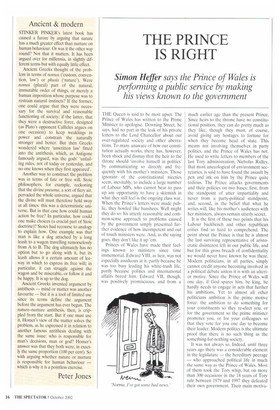Ancient & modern
STINKER PINKER's latest book has caused a furore by arguing that nature has a much greater effect than nurture on human behaviour. Or was it the other way round? Not that it matters. It has been argued over for millennia, in slightly different terms but with equally little effect.
Ancient Greeks thought of the problem in terms of nomos ('custom, convention, law') or phusis ('nature'). Were nomoi (plural) part of the natural, immutable order of things, or merely a human imposition whose purpose was to restrain natural instincts? If the former, one could argue that they were necessary for the survival and reasonable functioning of society; if the latter, that they were a destructive force, designed (as Plato's opponent Callicles argues on one occasion) to keep weaklings in power and constrain the naturally stronger and better. But then Greeks wondered where 'unwritten law' fitted into the antithesis, which, as Antigone famously argued, was the gods' `unfailing rules, not of today or yesterday, and no one knows when they first appeared'.
Another way to construct the problem was in terms of fate or free will. Stoic philosophers, for example, reckoning that the divine pneuma, a sort of fiery air, pervaded the whole universe, argued that the divine will must therefore hold sway at all times: this was a deterministic universe. But in that case how could human action be free? In particular, how could one make choices (a crucial part of Stoic doctrine)? Stoics had recourse to analogy to explain how. One example was that man is like a dog attached by a long leash to a wagon travelling remorselessly from A to B. The dog ultimately has no option but to go along with it, but its leash allows it a certain amount of leeway in which to express its free will; in particular, it can struggle against the wagon and be miserable, or follow it and be happy. It is up to the dog.
Ancient Greeks invented argument by antithesis — mind or matter was another favourite — but it is a tool of limited use since its terms define the argument before the argument has ever begun. The nature–nurture antithesis, then, is crippled from the start. But if one must use it, Homer's view of the matter solves the problem, as he expressed it in relation to another famous antithesis dealing with the same issue: who is responsible for man's decisions, man or god? Homer's answer was that they both were, in exactly the same proportion (100 per cent). So with arguing whether nature or nurture is responsible for human behaviour — which is why it is a pointless exercise.
Peter Jones




































































 Previous page
Previous page